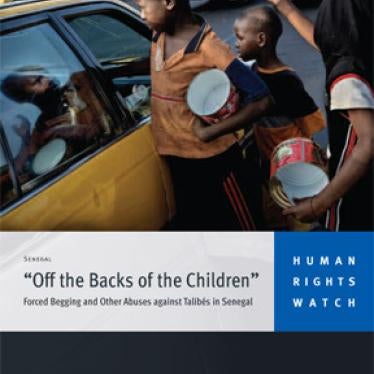(Dakar) – Senegal’s new government should make it a priority to protect the estimated 50,000 children forced to beg each day on the country’s streets, a coalition of Senegalese civil society organizations, Anti-Slavery International, and Human Rights Watch said today. Macky Sall will be inaugurated as president on April 2, 2012, after defeating incumbent President Abdoulaye Wade in the March 25 presidential runoff vote.
Known in Senegal as talibés, these children are sent by their parents to a daara, or Quranic school, to receive a Quranic education under a marabout, or spiritual guide. While many marabouts in Senegal continue the traditional practice of teaching their students the Quran, others have twisted the practice into a form of economic exploitation.
“It is paramount for President Sall to extend the new era he has described to Senegal’s most vulnerable,” said Catherine Turner, child labor program co-ordinator at Anti-Slavery International. “Forced child begging is one of the worst forms of child labor and despite being clearly visible, tens of thousands of talibés are still suffering in Senegal. The government must enforce its own laws to protect talibés from this abuse and ensure that the education received in daaras equips these children with a rounded education, and does not allow forced begging.”
As documented in reports by Anti-Slavery International and Human Rights Watch, an estimated 50,000 talibés, most between the ages of 5 and 14, are forced by their marabout to beg in the streets for up to eight hours a day. Many of these exploitative marabouts impose a specific quota that the boys must return each day. Boys who fail to bring back the demanded sum often face physical abuse, including in some cases severe beatings or being chained or bound and left in isolation. Much of the money these boys bring back goes to the personal profit of their marabout, rather than to ensuring adequate food and health care, and a proper Islamic education for the children.
The Senegalese government enacted legislation in 2005 that criminalized forcing others into begging for personal financial gain. But the authorities have largely failed to take concrete steps to enforce the law and end the exploitation and abuse of the talibés. Nine marabouts were convicted in September 2010 for forcing children in their care to beg, but the majority received deferred sentences and were released immediately. The following month, Wade expressed dissatisfaction with the application of the law during a council of ministers meeting, effectively ending further arrests and prosecutions. In all but a few cases, severe physical abuse of the talibés has gone similarly unpunished.
With the exception of a few state-sponsored modern daaras – which combine Quranic and state school curricula – the daaras in Senegal are subject to almost no government regulation. This has in part led to the proliferation of the unscrupulous marabouts who have failed to educate or provide for children in their care.
“A key solution to ending the problem of forced child begging is for the government to accelerate the modern daara program,” said Mamadou Wane, spokesman for the Plateforme pour la protection et la promotion des droits humains (PPDH), a coalition of 50 mainly Senegalese organizations working on the issue of forced child begging in Senegal. “There is also an urgent need for the new government to enforce laws protecting children from violence, no matter who is responsible for committing it.”
On March 2, the International Labour Organization (ILO)’s Committee of Experts criticized Senegal for its failure to protect talibés from abusive conditions and demanded that Senegal do more to prosecute those responsible for forced begging and to carry out “daara modernization” – ensuring that the schools meet basic international standards of education and child protection. The Senegalese government was asked to attend the 101st session of the International Labour Conference in June to explain how it plans to address this issue as a matter of priority.
“The upcoming ILO conference provides the new government of President Sall with the opportunity to formulate a clear plan to end forced child begging,” said Matt Wells, West Africa researcher at Human Rights Watch. “Most of the necessary laws are already on the books. What’s needed now is the determination from President Sall to ensure that daaras continue the proud tradition of religious education, rather than become sites of child exploitation and abuse.”







